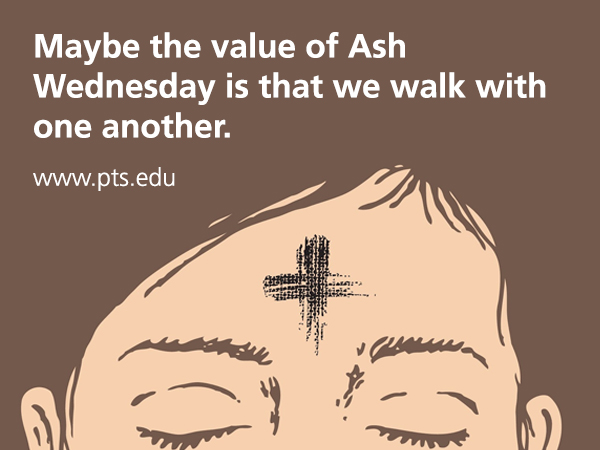For a few years, my middle child was afraid of Ash Wednesday. He’d sit patiently through the homily, mumble along with Psalm 51 as best he could, but balk at the main event: the imposition of ashes. So he’d stay behind in the pew while his brother, sister, and whichever parent wasn’t leading worship filed forward to receive the oily, ashy smudge.
The mystery of his fear was finally solved, when he asked, “Doesn’t it hurt?”
“What makes you think it hurts?” I asked.
“Ashes are hot.”
I could see the undulating glow of burning embers in his imagination, and I understood.
“Oh, no,” I said. “We order them, and they come in the mail in a tiny plastic bag. They haven’t been hot for a long time.”
But in a way, he was right. The words we hear on Ash Wednesday as a finger traces a cross on our foreheads—Remember you are dust, and to dust you shall return—are scorching words. Who would choose to come forward as the curtain is pulled back, and we glimpse the future, our futures: dust?
On the other hand, which is worse: walking with others to stare down our common destiny, joining the people of God in rehearsal for the time when each of us will have to confront this truth—dust—for ourselves; or staying behind, contemplating mortality alone?
Facing Dust
Not everyone gets to choose. Last week I read the stunning memoir, Everything Happens for a Reason (and Other Lies I’ve Loved), by Kate Bowler, a professor at Duke Divinity School, who was diagnosed with stage IV colon cancer at the age of 35.
She didn’t have the luxury of staying in the pew. The ashes came for her.
I loved the book because it beautifully displays the struggle of facing the dust without easy answers. As a scholar of the prosperity gospel, Bowler knows what Christianity-with-answers looks like: If you have the right faith and pray the right way, God will heal you. As much as she’d like to believe this, especially when she imagines leaving behind her husband and young son, she knows it’s false. The truth is more beautiful, and more difficult: “God is here. We are loved. It is enough.”
I also loved the supporting characters, the friends who choose to walk with Bowler in the valley of the shadow of death as far as they can even though they have nothing to offer—no magical incantations, no curative essential oils, no prescriptions for joy—but their wholehearted presence.
There’s Frank, a seminary colleague of Bowler’s and a Lutheran minister. “When my older colleague Frank, who lost his own adult son, found his way into my hospital room, he wrapped his strong hands around mine and said, quietly: ‘I wore this clerical collar to impress you. And also to get through hospital security.’” Presence. Connection. Humor.
And there’s Ray, a friend and pediatric oncologist. Ray has been in the room countless times with parents, sharing good news and bad; he’s watched patients recover and eased their dying; he’s one of the few people with whom Bowler can share the depths of her fear. “‘Are you okay?’ he asks. ‘Yes, yes, I’m okay. Except for about 10 minutes a day, I’m okay.’ Anyone else would have left it at that. He looks at me carefully. ‘What does it look like? Those 10 minutes?’ he asks.” Not anyone could stay with her to hear her answer, but Ray does.
I found myself choking up as Bowler shares these encounters, because the miracle of Frank’s and Ray’s capacity to enter her suffering, without trying to fix her, testifies to the beauty of what she’s discovering: God is here. We are loved. It is enough.
Simone Weil, the 20th Century philosophy and mystic, said, “The capacity to give one’s attention to a sufferer is a very rare and difficult thing; it is almost a miracle; it is a miracle.”
There is such hope and beauty in the quiet folks who show up, love, and dwell with Bowler in the place of dust.
Facing Ash Wednesday Together
Can Ash Wednesday be that kind of place?
Maybe the value of Ash Wednesday is not just the practice it gives us in acknowledging and facing our own mortality. Maybe it’s that we do it together, that we walk with one another toward the man or woman in the robes and with the darkened fingertip ready to mark us and utter those scorching words.
And maybe the power of Ash Wednesday is that we are brave enough to eavesdrop as someone beside us—a husband, wife, partner, parent, child—hears those portentous words as well.
And we don’t recoil from them; and they don’t from us.
Tonight our family will huddle together in a pew. We will say Psalm 51. And then we will walk forward. We will look together into this crystal ball and see our future: dust. We will do this as a choice, knowing it might not be a choice next week, month, or year.
We will practice being a miracle for one another, thankful that in several weeks the church again will pull back the curtain, will show us the future—the whole future this time.
The Rev. Dr. L. Roger Owens is associate professor of Christian spirituality and ministry at Pittsburgh Theological Seminary and teaches courses in the MDiv, Doctor of Ministry, and Continuing Education programs. Before coming to PTS he served urban and rural churches for eight years in North Carolina as co-pastor with his wife, Ginger. He has written multiple books including The Shape of Participation: A Theology of Church Practices which was called “this decades best work in ecclesiology” by The Christian Century.


Thanks, Roger. I listened to Kate Bowler being interviewed by Terry Grosse, Fresh Air, NPR, on 2-12. Now I must read her book.
Facing the dust together inspires us to face life bravely but calmly too. Thanks for sharing it.